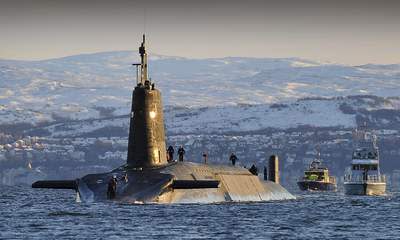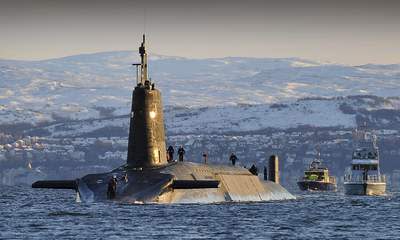Trident: Party Divisions On Nuclear Deterrent
The Government has published its review into possible alternatives to the current nuclear deterrent.
It has concluded that there are two possibilities for consideration: either a full like-for-like renewal of the capability or a reduced system which would mean three submarines in the nuclear fleet rather than four.
The review is a product of the coalition agreement in 2010 but highlights divisions between the Conservatives and Liberal Democrats.
The Conservatives favour a full replacement whereas the Liberal Democrats have committed to a reduced system, although it is unclear exactly what form this would take.
It was widely believed that the Liberal Democrats would opt to cut the system in half, meaning that only two new submarines would be built.
However, that possibility was not examined in the review.
Instead the party appears to be favouring a cut in the fleet to three submarines. That would save £4 billion over 40 years.
Neither of those options would retain the constant at-sea deterrent.
Chief Secretary to the Treasury Danny Alexander outlined the review's scope:
"The review was tasked to answer three questions.
"First, are there credible alternatives to a submarine-based deterrent? Second, are there credible submarine-based alternatives to the current proposal? Third, are there alternative nuclear postures which could maintain credibility?"
The answer to the first question was no. The current submarine option remains the most credible.
In response to the other questions, Mr Alexander said: "The review opens up a much greater opportunity for change in its consideration of alternative postures - and that in turn opens up the possibility of maintaining our nuclear weapons capability with fewer submarines.
"Taken together, this is where the real opportunity resides for making long-term savings, for recalibrating our nuclear weapons policy to the requirements of our age, and to contributing to nuclear disarmament.
"We can afford to go much further in de-alerting our nuclear deterrent.
"The option of non-continuous deterrence does not threaten current security. And by changing postures we can reduce cost at the same time."
The Conservatives argue that anything other than a like-for-like replacement would jeopardise the UK’s national security, relationship with the United States, and reduce the country’s international reputation.
Defence Secretary Philip Hammond told Sky News: "Over the next 50 years we cannot know who our potential adversaries might be, what kind of instability there is going to be in the world.
"It would be reckless to abandon a system which has delivered Britain unprecedented levels of national security since we started continuous at sea patrolling 45 years ago.
“If we had two boats … we would not have the certainty of being able to respond to an attack.
"The whole principle of a deterrent is that the potential enemy knows that if they attack you, however much damage they inflict upon you, somewhere under the ocean you have the ability to strike back.
"We shouldn’t gamble with the idea of a part-time deterrent, Britain’s national security is too important."
A decision needs to be made in 2016, after the next General Election.
If either the Labour Party or Conservative Party were to win an outright majority, it is likely that the constant deterrent would be renewed.
It’s not clear how significant the debate might become should there be a need to form another coalition.
Responding to the Review, the Shadow Defence Secretary Jim Murphy said: "Labour has always said that we are committed to the minimum credible independent nuclear deterrent, which we believe is best delivered through a continuous at-sea deterrent.
"It would require a substantial body of evidence for us to change that, but this review does not appear to offer such evidence.
"We will rightly continue to scrutinise today’s report on the grounds of capability, cost and disarmament."

 Yahoo News
Yahoo News 

